December 2024
An interview with Laura Sims, idk my bff Nicole Kidman?, and Carmen Maria Machado's new short story will break your heart
What’s new
YOU GUYS!
This is not book news, but something AMAZING happened last week: I went to the premiere of the film Babygirl!
!!!!
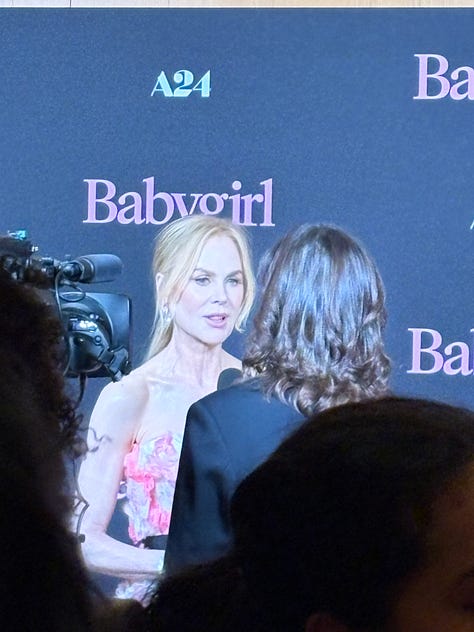
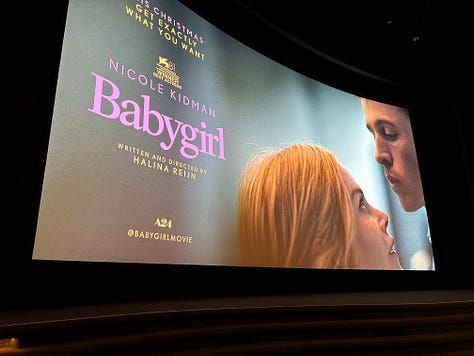
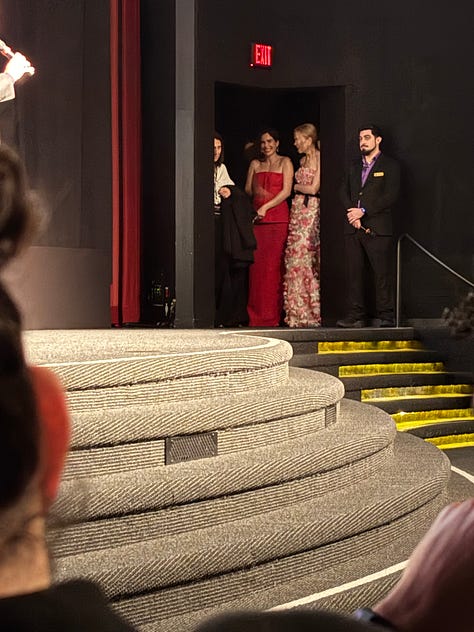
Babygirl is a movie about how you can be a SHE-O and married to Antonio Banderas and STILL need to fall into a torrid fling with your young intern because being a human woman in the world is pretty much a zero sum game, even if you are beautiful and rich and white and Nicole Kidman. (I’m being facetious…mostly.)
But really, it’s a film unlike many I’ve seen before (at least in a mainstream release starring NICOLE KIDMAN): female gaze-driven, a true portrait of a woman’s interiority, a story about shame and authenticity and marriage and all the ways power and control can get mixed up in various realms of your life, and Antonio Banderas’ arms, which are roughly the circumference of a toddler. (Merry, merry, merry Christmas!) Halina Reijn, the director and writer, retired from her acting career in the Netherlands to become a filmmaker and I will be following just about everything she puts out from now on.
I loved it. Don’t see it with your family on Christmas. But definitely go see it.
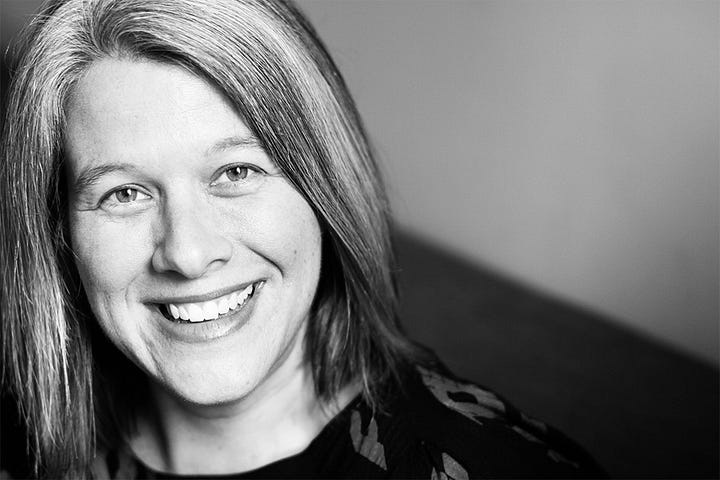
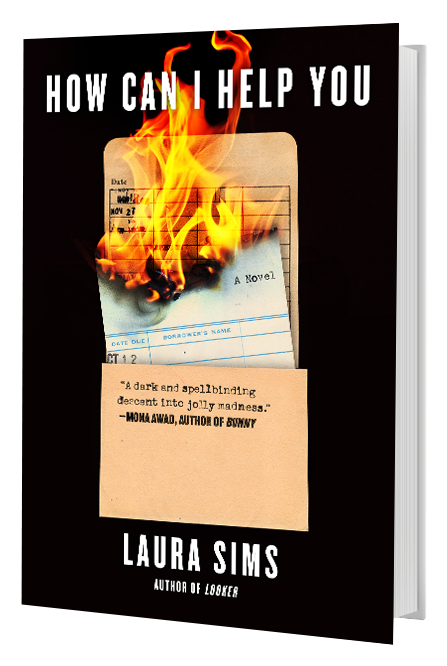
Laura Sims is the author of HOW CAN I HELP YOU, a New York Times, Publishers Weekly, Book Riot, and CrimeReads Best Book of the Year; a LibraryReads Top Ten Pick of July; and an Amazon Editors’ Pick for Best Mystery, Thriller & Suspense. Sims’s first novel, LOOKER, was included on “Best Books” lists in Vogue, People Magazine, Real Simple, Entertainment Weekly, and more, and is now in development for television by eOne and Emily Mortimer’s King Bee Productions.
An award-winning poet, Sims has published four poetry collections; her essays and poems have appeared in The New Republic, Boston Review, Lit Hub, and Electric Lit. She and her family live in New Jersey, where she works part-time as a reference librarian and hosts the library’s lecture series.
Can you remember what the first seeds of the idea for HOW CAN I HELP YOU came from? Did the idea come fully formed, or evolve—and if it evolved, how?
The idea for the novel evolved over time. One seed was planted by a co-worker of mine, who told me on my first day of work (at a public library) that someone had died in the downstairs public restroom about two months before. I was shocked, of course, and the imagined scene of finding this unfortunate person in our mint green-tiled bathroom stayed fixed in my mind. Years before this, I'd listened to an episode of a true crime podcast called "Criminal" about Jane Toppan, serial killing nurse from 1800s Massachusetts, and found her fascinating. I was interested in the disconnect between her cheerful public mask and the gruesome acts of murder she committed in private.
The final seed came from working at the reference desk of a public library, and being surprised by the sorts of calls and encounters I had with patrons. I can't remember when these separate threads joined, and I thought of combining my nurse serial killer with the public library, but it seemed inevitable once I had the thought. Originally, Margo alone narrated the novel, but I found she needed a foil and a sort of friend—hence the introduction of Patricia.
I love that WE HAVE ALWAYS LIVED IN THE CASTLE by Shirley Jackson plays such a formative role in your book (it's my favorite Jackson novel, and one of my favorite novels of all time). Did you always know it was going to be part of the story? How and when did you decide to weave it in?
I feel the same way about We Have Always Lived in the Castle. I didn't know it would be part of the story until I picked it up and reread it while in the midst of writing the novel. I realized, in reading it, that there were some productive/interesting overlaps between it and the story I wanted to tell—and obviously Margo and Merricat share some DNA—so I tucked it in and hoped it would help illuminate some key moments. It also served as a nice connecting point between Patricia, who loves to read and loves the novel, and Margo, who doesn't really read, but sees Patricia admiring the novel and decides to read it. I so enjoyed writing about her falling for this novel.
What are some of your favorite books that reference other books, or use other works of literature to enhance and deepen the narrative?
Flaubert's Parrot by Julian Barnes (references Madame Bovary and other Flaubert books)
A Head Full of Ghosts, by Paul Tremblay (references WHALITC)
All's Well, by Mona Awad (references Shakespeare's All's Well That Ends Well, Macbeth)
The Name of the Rose by Umberto Eco (references the bible and probably more)
Atonement by Ian McEwan (the book itself is revealed to be the draft of a novel)
Where do you go to refill your creative well?
To the town pool—at least in summer. After spending the morning writing, there's nothing I enjoy more than swimming laps until I'm exhausted.
Another place I go to recharge: to the movies. Thinking of summer again—I love sitting in a cool theater, watching a good horror movie in the middle of a hot day.
What have you learned about your process of writing now that you didn't know when you first started?
I often get an alluring idea for a new novel in the middle of "the slog" of writing another novel. When I was first starting out, I would abandon whatever my current project was for this bright, shiny thing, thinking it would be the answer to all my problems...that *this* new book would be perfect, easy, free of obstacles. Haha. Now I've learned to stay the course, keep my head down, and finish what I've started. If the new idea is really worthwhile, it will still be there when I've finished.
What's a book or movie or piece of art or other you wish you'd created?
I really wish I'd made PARASITE, the 2019 film directed by Bong Joon-Ho. To me, it's nearly perfect: it blends genres that don't usually mesh—comedy, horror, family drama, thriller—and delves into class issues without being pedantic or boring. I love all of his films, starting with "Memories of Murder," but this one is a total masterpiece. It's inspired me to play with/ignore genre boundaries and definitions in my own work.
What do you think people would be most surprised to discover you're obsessed with?
Pet rats. We had a pair of pet rats for about a year and a half—their life spans are very short. But they were the sweetest, funniest, smartest little pets, and totally changed my mind about rats in general. I was obsessed with them while they were alive; now I follow a couple on Instagram (@emperorsofmischief) who have trained their pet rats, Kuzko and Kronk, to drive little cars...they are truly amazing. And adorable. Give (pet) rats a chance!
Thank you so much, Laura! Such great answers, and I’m bumping “Memories of Murder” to the absolute top of my watchlist now!
My current open tabs1:
Melanie Anagnos was kind enough to forward me this review of noir director Robert Siodmak’s retrospective in New York, and now I definitely need to make a conscious effort to dive into his oeuvre. If you’re not reading Melanie’s Substack, Cherchez la Femme, you are missing out!
Unfortunately I read this writing advice from Chuck Palahniuk (I mean, maybe? Or maybe some dude saying he’s Palahniuk?) on a lil Instagram post and I can’t stop thinking about how good it is.
🚨NEW CARMEN MARIA MACHADO SHORT STORY OUT, NOT A DRILL 🚨
Working on something that’s taken me down the rabbit hole of Frances Glessner Lee’s murder dolls…
And the typo demom comes for us all!
Let’s get real: I have like 200 open tabs. These are just the ones I’m sharing this month, because a Substack list cannot go on indefinitely.




The Chuck Palahniak writing advice!!
Great interview with Laura Sims (and will take the recommendation on the Carmen Maria Machado short story). And thank you so much for the kind words on Cherchez La Femme.